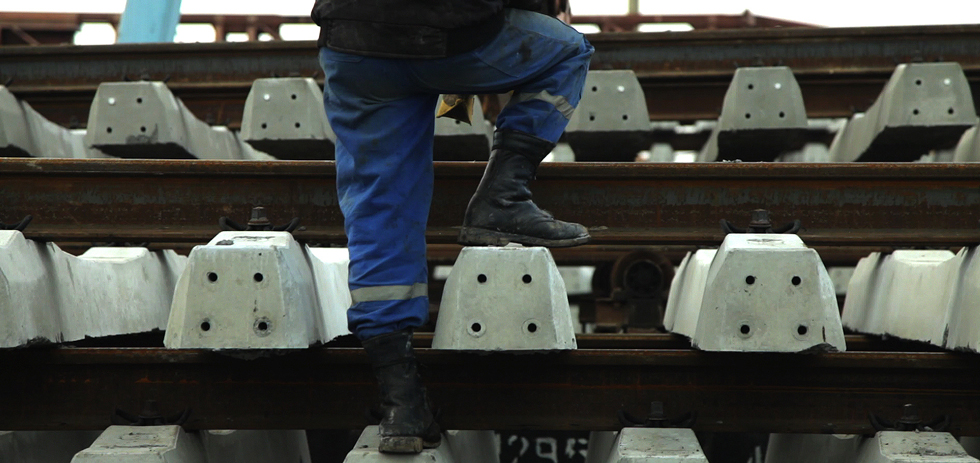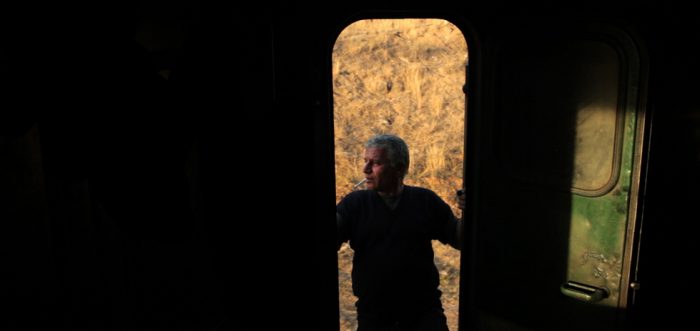
We’re in a run-down bedroom somewhere in the Caucasus, watching a middle-aged man watch television. The bottom-half of the long wall behind him has been painted a creamy pink; its top half is broken up into uneven rectangles of brown and teal. The teal paint is fading at points, revealing the pink base coat underneath. Dotted across the wall, almost forming an arc above him, are large splotches of white paint masking repair work, though one gets the feeling that these are not recent repairs, nor recent paintwork. A newsreader is announcing progress on a train line connecting Europe to Asia, specifically a section of the line that will link Azerbaijan to Turkey (Baku to Kars, via Tblisi). The man sighs. The report ends. He turns to camera, and notes matter-of-factly that “it will be a powerful railway”.
This is how you make a film about the decades-long land fight between Armenia and Azerbaijan without ever saying so. The seeming simplicity of cinematographer Martin DiCicco’s debut feature All That Passes by Through a Window That Doesn’t Open — a documentary primarily concerned with the day-to-day labour of Azeri track workers — masks inescapable economic and physical conflicts. Nagorno-Karabakh, the still-contested region that sparked all-out war between Armenia and Azerbaijan in the late 1980s, is merely alluded to — and only in reference to the 1993 closure of the Turkish-Armenian border.
The workers on the Azeri side don’t reflect on the political and regional maneuverings of the past; they are committed to forward progress — wholly bound to their work, sleeping and eating in a makeshift train car caravan next to the tracks. One of the men admits that their sense of time passing has changed as a result: events are marked by kilometres, not hours or days. So too for the viewer; with no real sense of time or definite location, we’re drawn not to the gorgeous rolling hills that the train passes through but to DiCicco’s makeshift boundaries.
The frame is often divided, neatly and vertically, but always in a way that positions the men as oppositional to their surroundings — we see one Azeri worker finishing a morning prayer; he’s contained in a window in the left of frame, as the expanse of sky and land fill out the right side.1 Brooklyn-based, Serbian-born editor Iva Radivojevic also imposes a demarcation of time and space — chapter breaks, each marked with an aphorism about an individual (the engineer, the breakman, the passenger) — a device continued from her 2014 feature Evaporating Borders.2

The first chapter — concerning the Azeri workers — takes up around three quarters of the film’s runtime; comprising the remainder is a quietly pointed reflection on the economic impact of the Nagorno-Karabakh conflict on Armenian society. It’s here, in a run-down and forgotten train station, that we once again meet the man from the the start of the film, who sat on the bed (in front of the pink-brown-teal wall) watching the news. Despite there being no substantive work, this stationmaster and his crew find ways to pass the time: they cook, listen to music, complain about bureaucratic oversight. This is to say, that what the Azeris do away from the job seems to be all that the Armenians have to do. Armenia’s economy suffered dramatically in the wake of the 1993 Turkish-Armenian border closure; this station exists in a bizarre suspended time, where the stationmaster’s hope that industry will return is tinged with a weary acceptance of circumstances.3
The disconnect between the work of individuals and the interactions of nation-states is the strongest common factor between the train workers in each country, rather than the cultural parallels of routine which the film takes pains to identify.4 The economic future of Azerbaijan is bright thanks to its oil fields and the ensuing alliances with the West, yet the workers we see are improvising day to day; they rely upon the hospitality of rural Georgians (and their gardens) for sustenance, due to their delayed paychecks.5
Though not an exacting portrait of labour or regional conflict, All That Passes by Through a Window That Doesn’t Open uses its elision of history as an effective prompt. The floating voiceover testimony from workers on both sides emphasises the ruptures between past and present, landscape and individual, and the reliance on striking wide compositions throughout sets up another profound disconnect; the film’s shrewd final shot positions us as helpless onlookers, watching the landscape pass by, of course, through a train window that doesn’t open.
